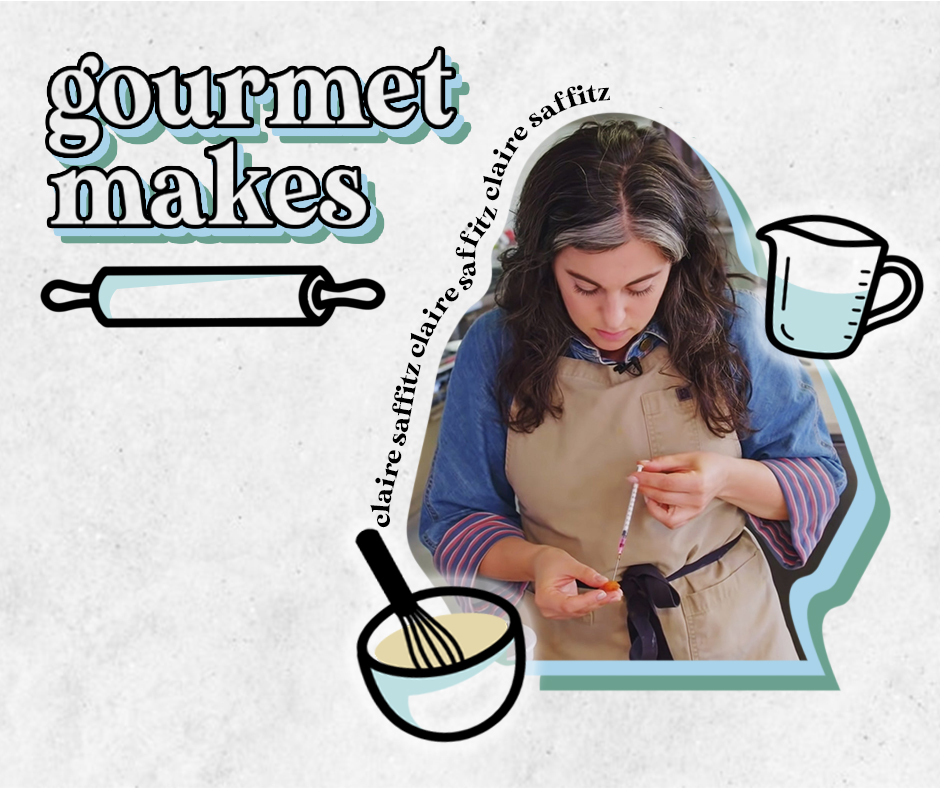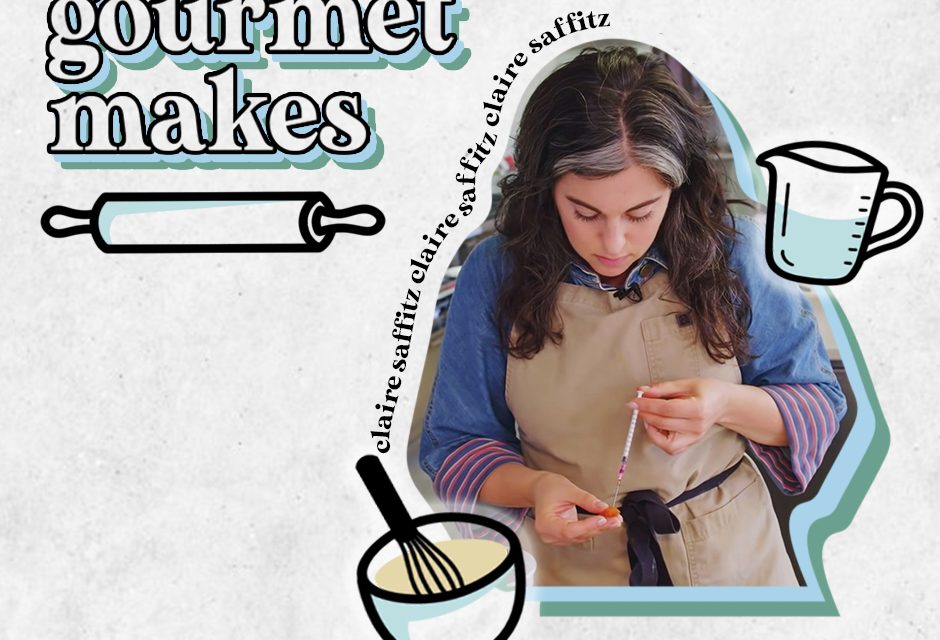
Claire Saffitz, former host of Bon Appétit’s “Gourmet Makes” channel (The Emory Wheel/Ally Hom)
For the last three weeks, as I complete my treacherous goal of running every day, I have unapologetically binged Claire Saffitz’s “Gourmet Makes” videos while running on the treadmill as a means of curbing my boredom. Saffitz attempts to recreate numerous childhood favorites, like Oreos, Pocky and tater tots, just to name a few. Through the show, I have come to adore Saffitz as an icon of entertainment, relatability and inspiration, spearheading a series that offers valuable life lessons to normalize failure.
As of 2020, Saffitz is no longer employed at Bon Appétit, and I want to acknowledge that I in no way condone the actions of Bon Appétit or its editor-in-chief, Adam Rapoport. Rapoport resigned in 2020 after a 2013 photo of him in brownface resurfaced on the internet, catalyzing investigation into the unequal, racist culture manifesting within the magazine and its parent company Condé Nast. This is an issue I hope to bring to light in a subsequent article, though.
At the beginning of each episode, Saffitz introduces the food she will create, a tantalizing spread I can only imagine gets devoured by the rest of the Test Kitchen staff behind the scenes. Next, she measures, inspects and deconstructs the food itself to get an idea of how it may have been made. Saffitz analyzes each component with all five senses, illustrating a prime example of her approach to problem solving. I first noticed this while watching her Girl Scout cookie recreation, where she scraped the chocolate off a Tagalongs cookie to reveal a depression and button-lipped cookie.
From extensive research, Saffitz also found a similar concaving structure to exist in the Samoas cookie, and deduced that the caramel filling should run through that crevice. Saffitz spends a majority of her videos conducting research. She narrates each step, reflecting on what could be improved upon after each try and making subsequent changes. It is precisely this attention to detail and due diligence that builds a realistic portrayal of how professional recipes are tested. Saffitz, albeit semi-unconsciously, teaches that nothing starts out perfectly.
The research stage has one final component: reading the list of ingredients on the package. From the start, Saffitz reading the artificial chemicals and food colorings, like disodium inosinate from the Takis video, reminds me of health class: “If you don’t know how to pronounce the ingredient, you probably shouldn’t eat it!” Reflexively, I wonder if all these chemicals I’ve ingested will someday destroy my insides. They probably (and hopefully) won’t while I’m still alive. But this is the gist of “Gourmet Makes”: Saffitz throws all those unintelligible compounds to the wind and creatively engineers a healthier, less artificial, final product.
Now, it must be noted that Saffitz’s success is inversely proportional to the length of the video. Generally, the longer the video, the less imminent her success — making it all the more entertaining when she declares she’s doing well eight minutes into the video. Sometimes this results in a nearly 40-minute long video, like her challenge to make Krispy Kreme doughnuts, but it’s worth watching. Unlike other cooking videos that only show a set of hands, time lapse videos and the magical appearance of the finished result, “Gourmet Makes” is filmed in real time. As viewers, we experience every sigh, every eye roll and every greyscale scene of Saffitz and melancholy classical music in the background. We empathize with her frustration, because out of all these cooking videos, she remains authentic, honest and above all, human. Her struggles are incredibly relatable, apparent from the thousands of memes that viewers have created of her ups and downs throughout the series. The result is never perfect on her first try. Sometimes the chocolate is not tempered properly, or the pretzel dough of the Combos is nearly burnt, or the taffy is too elastic — but she keeps going.
Anyone who has watched just one episode involving chocolate will inevitably hear Saffitz complaining to fellow coworkers about tempering chocolate or finding a way to avoid the delicate tempering process. As a society, we emphasize on how complaining negatively impacts yourself and those around you. But while this may be true, it is equally worth noting that this negative stigma against complaining could only cause further repression of your emotions. Saffitz complains to verbalize and validate her stress and frustrations, embrace her failures, and persist to the end. For Saffitz to do so, not to mention on camera, shows her emotional maturity. Instrumental complaining, or complaining with an actionable goal, helps people work through and identify problems. It’s time to stop diminishing emotions and relegating them to a taboo corner of society.
Though she was originally hesitant to share the unfiltered, unedited process of her cooking, Saffitz later realized it was worth it. “‘Gourmet Makes’ has absolutely made me, a natural perfectionist, much more comfortable with failure.” Saffitz said in an interview with Huffington Post. “I grew up as a high-achieving person in a family where that was important and I looked at failure very, very negatively. I have absolutely learned that you learn so much more from the failures than successes.”
At the end of each episode, Saffitz invites her colleagues in the Test Kitchen to taste the results. But they aren’t the ultimate judge, she is. Saffitz sets her own standards and decides when a challenge is over. Testing a recipe is no different from doing anything else: everything can be infinitely improved on. “In the absence of any true perfection, you only have yourself and your own taste levels,” Saffitz said.
Saffitz is right. In a world that demands perfectionism, you’re the central figure in determining what is good enough. These words of wisdom don’t come directly from the show, but nevertheless its message is unconsciously infused throughout the series. Saffitz manages to win over the internet, not through seamless perfection, but through her endearing human honesty — and of course, her infectious personality and humor. Perfection is overrated. Instead, we should learn from Saffitz and accept our failures.
Sophia Ling (24C) is from Carmel, Indiana.
Sophia Ling (she/her) (24C) is from Carmel, Indiana and double majoring in Political Science and Sociology. She wrote for the Current in Carmel. She also loves playing guitar and piano, cooking and swimming. In her free time, she learns new card tricks and practices typing faster.





